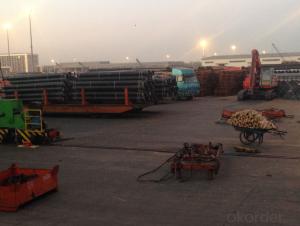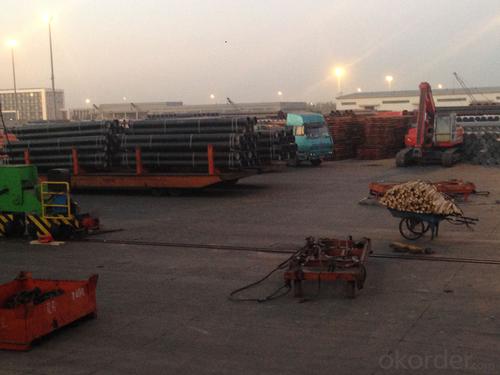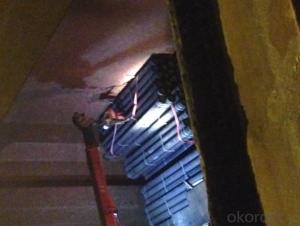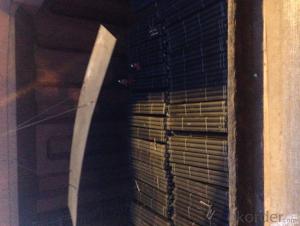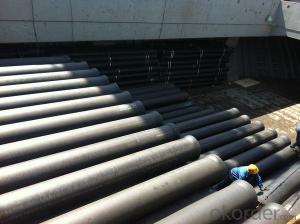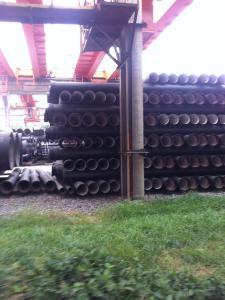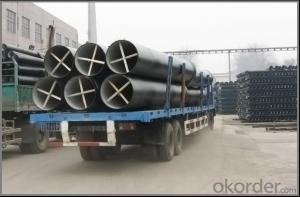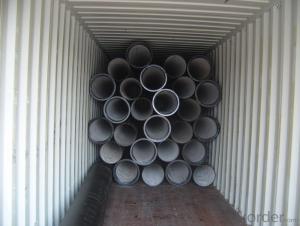DUCTILE IRON PIPES& PIPE FITTINGS C DN100
- Loading Port:
- Tianjin
- Payment Terms:
- TT OR LC
- Min Order Qty:
- 25 m.t
- Supply Capability:
- 30000 m.t/month
OKorder Service Pledge
OKorder Financial Service
You Might Also Like
Material : Ductile Cast Iron
Size Range : DN 80mm to DN 2000mm
Unit Effective Length : 6m or 5.7m
Manufacture Standard: ISO 2531:1998/ EN 545:2006/EN 598:2007
Annual capacity : 200,000 tons
Coating Exterior: Zinc 130g/m2 according to ISO 8179-1 and bitumen coating 70 microns.
Cement Interior: Portland Cement/ High Alumina Cement/ Sulphate Resisting Cement Lining according to ISO 4179
Special requirements on external coating and internal lining can be applied
We also provide accessories such as SBR/EPDM rubber gaskets, lubricant paste, pipe caps, PE sleeves, etc.
Additional Parts:
Each pipe is strictly inspected according to related standard to ensure permanently high performance.
Easy Installation at site and service free for life
Long Service Lifespan
Quotation will arrive you within 24hours once we get your inquiry.
We guarantee offering you a competitive price.
A copy of original inspection reports of pipes will be offered after shipment.
Photos of loading process will be sent to the customer after shipment effect.
We will follow-up the delivery progress after shipment effect and update to the customer on weekly basis.
- Q: Ways of connecting ductile iron pipes
- Ductile iron pipes are all made of flexible interfaces.
- Q: Are ductile iron pipes resistant to impact damage?
- Yes, ductile iron pipes are highly resistant to impact damage due to their inherent strength and durability.
- Q: How do ductile iron pipes handle thermal expansion and contraction?
- Ductile iron pipes are known for their excellent ability to handle thermal expansion and contraction. This is mainly due to their unique composition and design which allows them to withstand changes in temperature without experiencing significant damage or deformation. Thermal expansion occurs when a material expands due to an increase in temperature, while thermal contraction refers to the contraction that occurs when a material cools down. Ductile iron pipes can effectively accommodate these changes in temperature by utilizing their inherent flexibility and strength. One of the key factors that enable ductile iron pipes to handle thermal expansion and contraction is their high ductility, which refers to their ability to deform without breaking. This ductility allows the pipes to absorb the expansion and contraction forces without cracking or rupturing. Moreover, the composition of ductile iron pipes includes graphite nodules, which act as microcracks that can absorb stress and prevent the material from fracturing. This unique microstructure enhances the pipes' resistance to thermal expansion and contraction. In addition, ductile iron pipes are often designed with joints that allow for limited movement. These joints, such as mechanical joints or push-on joints, can accommodate the expansion and contraction of the pipes by providing a certain degree of flexibility. This helps to prevent the pipes from becoming overstressed or damaged. Overall, ductile iron pipes are specifically engineered to handle thermal expansion and contraction effectively. Their high ductility, unique microstructure, and joint design make them a durable and reliable choice for applications where temperature variations are expected.
- Q: Can ductile iron pipes be used for pressure reducing stations?
- Yes, ductile iron pipes can be used for pressure reducing stations. Ductile iron pipes are known for their high strength and durability, making them suitable for handling high-pressure applications. They have excellent resistance to corrosion and can withstand the mechanical stresses and strains associated with pressure reducing stations. Additionally, ductile iron pipes have a smooth interior surface, which reduces friction losses and helps maintain a constant and controlled pressure within the system. Therefore, ductile iron pipes are a reliable and commonly used material for pressure reducing stations.
- Q: Principles for the antiseptic treatment of ductile iron pipes
- 4. epoxy ceramic liningEpoxy ceramic lining is suitable for sewage pipes and gas pipelines, but because of its difficult manufacturing process and high cost, it has some limitations in its use. Epoxy ceramic lining has a high adhesion and finish. It is an excellent anti-corrosion coating.5. aluminate cement coating or sulphate cement coatingThese two special cement coatings are suitable for internal corrosion protection of nodular iron pipes used in sewage pipes to improve the corrosion resistance of acid and alkali components in sewage.
- Q: What are the typical bedding and backfill requirements for ductile iron pipes?
- To ensure the correct installation and long-term effectiveness of ductile iron pipes, it is important to adhere to the typical requirements for bedding and backfill. The bedding material should be a granular substance that provides support and evenly distributes the load on the pipe. Suitable materials include sand, gravel, or crushed stone. The bedding material should be placed uniformly and continuously along the bottom of the trench, with a minimum thickness of 6 inches. The width of the bedding layer should be at least 1.5 times the outer diameter of the pipe, or as specified by the pipe manufacturer. Once the bedding is in place, the remaining space around the pipe should be filled with backfill material. This material should also be granular and free from large stones, debris, or organic matter. It should be compacted in 6-inch increments using appropriate compaction equipment. The backfill should be evenly distributed around the pipe, ensuring there are no gaps or voids. Excessive compaction should be avoided to prevent damage or deformation of the pipe. The backfill material should extend at least 12 inches above the top of the pipe. In addition to following the bedding and backfill requirements, it is crucial to adhere to any specific guidelines provided by the pipe manufacturer. These guidelines may include recommendations for specific materials, compaction methods, or additional protective measures. Overall, proper bedding and backfilling of ductile iron pipes are essential for maintaining the structural integrity and preventing damage or failure. By following industry standards and manufacturer specifications, the pipes will perform effectively and last for a long time in various applications.
- Q: How much is the working pressure of ductile iron pipe used in water supply pipe and how is MPa determined?
- No, the work pressure is generally 0.4~1.6MPa, but the ultimate test pressure of ductile iron pipes is about 4.0MPa.
- Q: What is the weight of ductile iron pipe compared to other pipe materials?
- Ductile iron pipe is generally heavier compared to other pipe materials. Its weight can vary depending on the size and thickness of the pipe, but generally, ductile iron pipe is denser and has a higher weight per unit length compared to materials like PVC, HDPE, or steel. This higher weight of ductile iron pipe is primarily due to its composition, which includes iron and carbon, making it a sturdy and durable option for various piping applications.
- Q: How are ductile iron pipes different from cast iron pipes?
- Ductile iron pipes are different from cast iron pipes in terms of their composition and properties. Ductile iron pipes are made from a type of cast iron that has been treated with magnesium to improve its strength and flexibility. This makes ductile iron pipes more durable, impact-resistant, and less prone to cracking or breaking compared to traditional cast iron pipes. Additionally, ductile iron pipes have a higher tensile strength, allowing them to withstand higher internal and external pressures. In summary, ductile iron pipes are a more modern and advanced version of cast iron pipes, offering improved performance and longevity.
- Q: Are ductile iron pipes compatible with other pipe materials?
- Generally, other pipe materials can be compatible with ductile iron pipes. The high level of flexibility and strength of ductile iron pipes allows for their connection with various materials like PVC, HDPE, and steel. Transition fittings are often utilized to securely and prevent leaks when connecting ductile iron pipes with other materials. To maintain the integrity of the pipeline system and ensure compatibility, it is crucial to follow industry standards and guidelines when joining different pipe materials.
Send your message to us
DUCTILE IRON PIPES& PIPE FITTINGS C DN100
- Loading Port:
- Tianjin
- Payment Terms:
- TT OR LC
- Min Order Qty:
- 25 m.t
- Supply Capability:
- 30000 m.t/month
OKorder Service Pledge
OKorder Financial Service
Similar products
Hot products
Hot Searches
Related keywords
